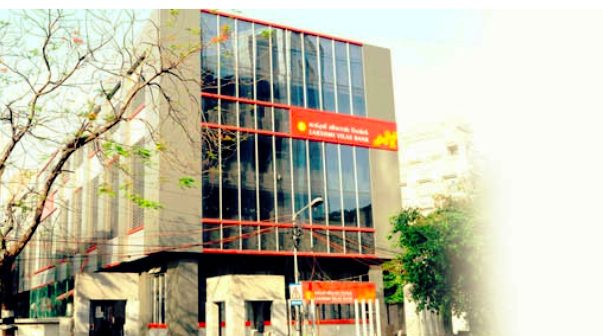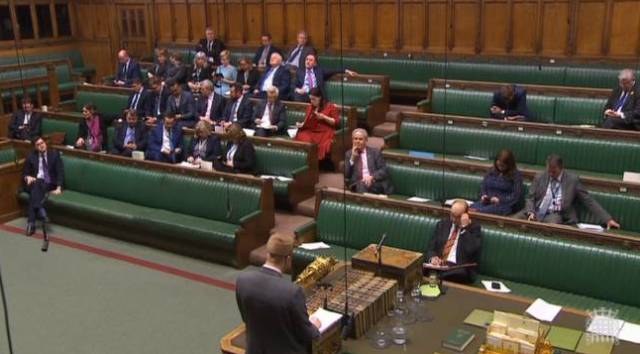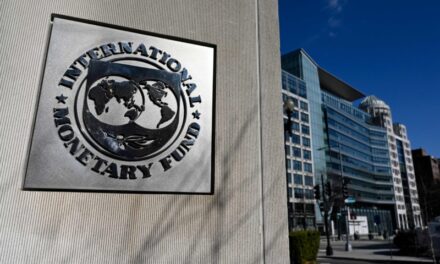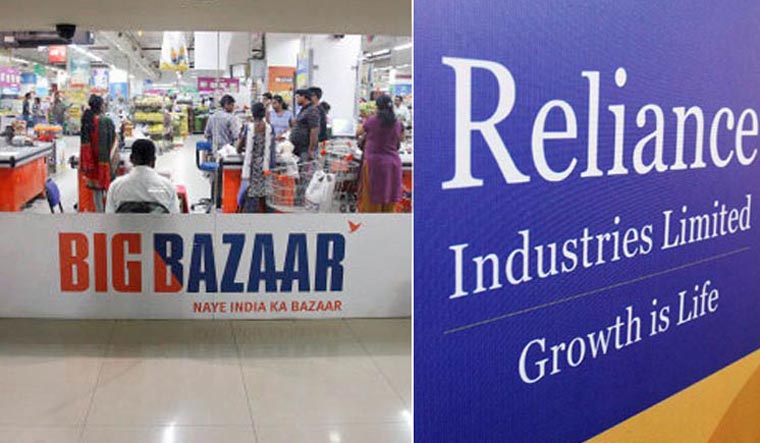The Reserve Bank of India (RBI) took control of LVB on November 15 due to a ‘serious deterioration’ in its finances and temporarily capped withdrawals
Then the promoter opposed unilateral merger of LVB with DSB . But Inspite of objection Modi led BJP government on Wednesday approved the merger of Lakshmi Vilas Bank (LVB) with the Indian subsidiary of Singapore’s DBS, said a senior minister on Wednesday, adding that the blame for the lender’s collapse has to be fixed.
The amalgamation of Lakshmi Vilas Bank with DBS India subsidiary is in the interest of Lakshmi Vilas “employees, customers and investors”, said the BJP Minsiter Prakash Javadekar at a media briefing in Delhi.
“The government has asked the RBI to take action against the people in the management who drive banks to the brink of collapse—liability has to be fixed.”
“Union Cabinet approves Scheme of Amalgamation of Lakshmi Vilas Bank with DBS Bank India Limited. With this, there’ll be no further restrictions on depositors regarding the withdrawal of their deposits,” he said,
The RBI’s proposed plan would give the Singaporean bank’s expansion ambitions a fillip as it would vastly increase the footprint of DBS in India, where it only has around 30 branches, according to Reuters..
Chennai-headquartered LVB, by contrast, has a vast network of more than 550 branches and 900-plus ATMs across India.
It is interesting to note Singapore-based DBS Bank, in 2018, wanted to acquire 50 percent stake in the Tamilnadu-based Lakshmi Vilas Bank (LVB) for above Rs100 per share, said one of the promoters of the bank.
In 2018, LVB appointed JP Morgan to scout for investors for a capital raising programme.
As a part of this, JP Morgan invited a large number of investors and the offers ranged from Rs100 to Rs 155 per share.
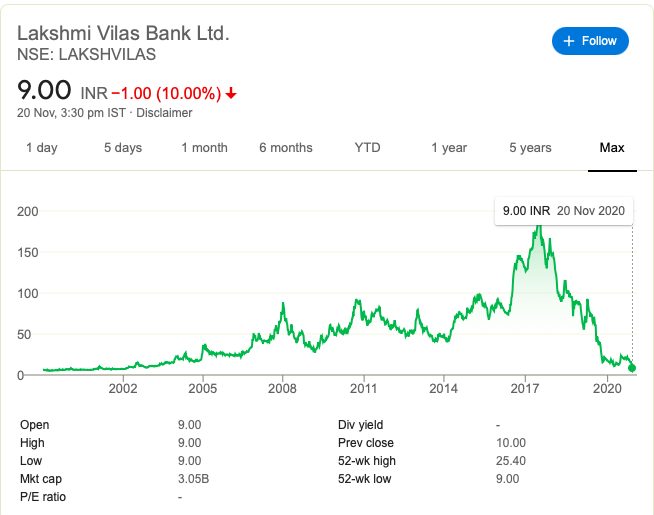
“That time, DBS approached JP Morgan for a strategic stake buy of upto 50 percent stake in LVB and was offering above Rs100 per share.
They wanted to control the bank and consolidate in the global balance sheet,” said K R Pradeep, one of the promoters of LVB bank told Moneycontrol in an exclusive conversation.
“Subsequently, both JP Morgan and DBS went to the RBI for a discussion.
But DBS wanted to retain the 50 percent stake in the times to come and wasn’t willing for dilution.
But, the RBI said DBS will have to comply with stake dilution norms application for all private bank promoters. Hence, the deal didn’t happen then,” Pradeep said.
Following this, DBS approached the government to pursue with the same request, Pradeep said.
“So, they wanted to acquire the bank for at least Rs 100 per share at one point.
And now, the entire bank has been handed over by the RBI to DBS at free-of-cost,” said aggrieved the Director of LVB Pradeep.
“There is a big valuation gap here,” said Pradeep. “DBS has a capital base of Rs 7,500 crore and a deposit book of Rs 25,000 crore.
They are getting an equal amount deposit book from LVB for zero capital. This makes a compelling case for a proper valuation,” said Pradeep.
LVB raised around Rs660 crore then from different investors including Indiabulls.
The RBI’s hurried bail out wasn’t warranted since there was no run on the bank at any stage and chances of recovery were present, Pradeep said.
The RBI then maintained that the dilution has to happen in promoter stake but DBS wanted to retain the controlling stake and put this condition forward, Pradeep said.
On November 17, shortly after announcing a one-month moratorium for LVB, the Reserve Bank of India (RBI) unveiled a draft scheme to merge LVB with DBS Bank India Ltd. (DBIL).
Announcing the scheme of amalgamation, the RBI said DBIL will bring in additional capital of Rs 2,500 crore upfront, to support credit growth of the merged entity, the RBI said.
This came after a failed attempt by the bank to merge itself with Pramod Bhasin’s Clix Group.
The RBI has resorted to forced mergers of troubled entities in the past on a few occasions. In 2006, the RBI announced a scheme of amalgamation for IDBI-United Western merger.
Prior to that in 2004, a similar amalgamation happened between the Global Trust Bank Ltd and the Oriental Bank of Commerce.
As per the draft scheme of amalgamation of the Lakshmi Vilas Bank (LVB) with DBS Bank India, the entire amount of the paid-up share capital will be written off.
“On and from the appointed date, the entire amount of the paid-up share capital and reserves and surplus, including the balances in the share/securities premium account of the transferor bank, shall stand written off,” according to the draft scheme published on the RBI website.
LVB shares closed at Rs10 per piece on BSE on November 19.
Institutional equity investors in LVB include Indiabulls Housing Finance Ltd, which had a 4.99 percent stake in the bank as of September 2020.
Prolific Finvest Private Ltd (3.36 percent), Srei Infrastructure Finance (3.34 percent).
MN Dastur and Co Pvt Ltd (1.89 percent), Capri Global Holdings Pvt Ltd (1.82 percent), Capri Global Advisory Services (2 percent), Boyance Infrastructure Pvt Ltd (1.36 percent) and Trinity Alternative Investment Managers (1.61 percent).
Pradeep said the RBI should do a proper valuation of the bank in the interest of the shareholders. “The regulator has taken a call.
Post-mortem of whether it is right or wrong won’t serve any purpose. Let’s do a proper valuation and the interest of equity holders should be protected,” said Pradeep.
Pradeep said the RBI should call the shareholders and the promoters for a discussion and exchange of views on the valuation to protect the interest of the shareholders.
Various options can be discussed at the meeting, he added.
The RBI has given time till November 20 for various stakeholders to give suggestions and objections for the draft scheme.
The worried equity holders of LVB had said they will explore all options to protect their interest after the details of the amalgamation came out.
“We hope that the regulator would opt for a solution that is fair and protects the interest of all stakeholders of the bank and does not discriminate one from another,” said one of the institutional investors requesting anonymity.
Investors are of the view that any move that hinders the principles of natural justice should be avoided.
“The shareholders and investors have stood by the bank during its crisis period and their interest should also be protected,” said the investor.
“In fact, several old generation private banks, many depositors are also the shareholders.
Hence we urge the RBI to reconsider the proposal of writing off the paid-up share capital and reserves which would affect both retail and institutional shareholders of the bank,” the investor said.
In the second quarter, LVB’s gross non-performing assets (GNPAs) stood at 24.45 percent, while net NPAs stood at 7.01 percent.
The bank’s Tier 1 Capital ratio has turned negative; the overall Capital Adequacy Ratio (CAR), as per Basel Ill guidelines, was at a negative 2.85 percent as of September 30.
The bank’s business has shrunk over the year. Total business stood at Rs 37,595 crore at the end of September 2020, as against Rs 47,115 crore at the end of September 2019.
The net loss after tax amounted to Rs 396.99 crore for the quarter ended September 30, as against a net loss of Rs 357.18 crore in the year-ago quarter.

